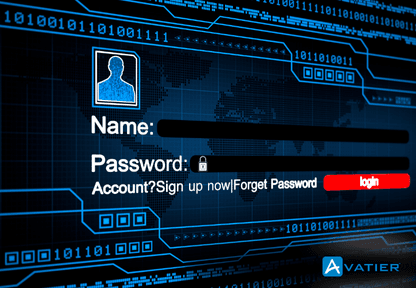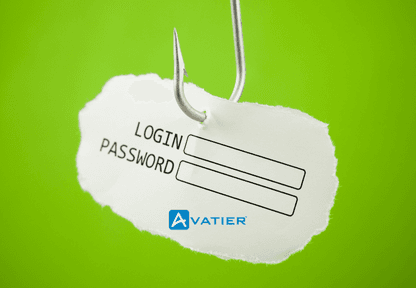August 29, 2025 • Mary Marshall
Streamlining Access with Single Sign-On (SSO): Why Leading Enterprises Are Switching to Avatier
Discover how Avatier’s SSO solutions outperform Okta and Ping Identity with AI-driven security, and zero-trust architecture.
The average enterprise manages 187 SaaS applications, with large organizations often juggling over 300 distinct platforms. This application sprawl creates significant security challenges—according to Verizon’s 2023 Data Breach Investigations Report, 74% of all breaches involve the human element, with credential theft and misuse leading the way. For modern enterprises, streamlining access management isn’t just about convenience—it’s a critical security imperative.
Single Sign-On (SSO) has emerged as the cornerstone of efficient identity access management, but not all SSO solutions deliver equal business value or security enhancement. As cybersecurity threats evolve, forward-thinking organizations require more than basic authentication functionality.
The Evolution of SSO in Enterprise Identity Management
Traditional password management approaches are rapidly becoming obsolete. Most IT leaders recognize that password-based authentication alone cannot meet current security needs, with 91% of security professionals reporting that their organizations still experience significant security issues despite password policies.
Modern SSO solutions have progressed beyond simple convenience features to become sophisticated security platforms that integrate zero-trust principles, AI-driven threat detection, and adaptive authentication. This evolution addresses the fundamental challenges facing enterprise identity management:
- Application Proliferation: The average employee uses 36 cloud services daily, creating numerous potential entry points for attackers
- Remote/Hybrid Work: 98% of workers express desire for remote work options, expanding organizational attack surfaces
- Complex Compliance Requirements: Regulations like GDPR, HIPAA, and CCPA demand granular access controls and comprehensive audit trails
- Credential Fatigue: Users juggling multiple passwords often resort to insecure practices, with 65% reusing passwords across accounts
Avatier’s SSO Software Solutions represent the cutting edge of this evolution, delivering enterprise-grade identity management that balances robust security with seamless user experiences.
Why Leading Enterprises Choose Avatier Over Competitors Like Okta and Ping
The SSO market is highly competitive, with Okta, Ping Identity, Microsoft, and SailPoint offering established solutions. However, Avatier has emerged as the preferred choice for forward-thinking enterprises seeking comprehensive identity management with distinctive advantages:
1. Advanced Zero-Trust Architecture
While competitors implement basic zero-trust principles, Avatier’s SSO platform fully embraces a “never trust, always verify” approach with:
- Continuous Authentication: Rather than one-time verification, Avatier constantly validates user identity through behavioral analytics and contextual factors
- Granular Access Controls: Policy enforcement at the application, feature, and data levels—more precise than competitors’ primarily application-focused controls
- Identity-Centric Security: Focusing on user identity verification rather than network perimeters, critical as 68% of organizations have experienced identity-related breaches in the past two years
2. AI-Driven Security Enhancement
Avatier leverages artificial intelligence to deliver proactive security measures:
- Anomaly Detection: AI algorithms identify unusual access patterns before they develop into security incidents
- Predictive Risk Analysis: Incorporating behavioral biometrics and contextual factors to assign dynamic risk scores
- Automated Remediation: Immediate corrective actions based on detected anomalies without administrative intervention
This AI integration reduces alert fatigue by 62% compared to traditional SSO solutions, according to organizations that have switched to Avatier from competitors.
3. Enterprise Integration Versatility
Avatier’s Identity Management Architecture provides unmatched flexibility for enterprise environments:
- Universal Connector Framework: Supporting 5,000+ applications through both standard protocols (SAML, OAuth, OIDC) and proprietary connectors
- Legacy System Support: Seamless integration with mainframe and on-premises systems that competitors often struggle to accommodate
- Custom Workflow Automation: Tailored authentication sequences for industry-specific needs in healthcare, finance, manufacturing, and government
A financial services client reported a 43% faster integration timeline after switching from Okta to Avatier, enabling them to secure legacy trading platforms that previously required separate authentication.
4. Unified Identity Control Plane
Unlike competitors who offer fragmented solutions for different identity management needs, Avatier provides a comprehensive identity control plane through Identity Anywhere Lifecycle Management that includes:
- Consolidated Administration: Single dashboard for managing all identity-related functions
- Unified Policy Enforcement: Consistent security policies across SSO, MFA, lifecycle management, and privileged access
- Comprehensive Audit Trail: Complete visibility into all access events across the entire identity ecosystem
This unified approach eliminates security gaps that emerge when organizations use separate solutions for different identity management functions—a common pain point reported by 76% of former Ping Identity customers who switched to Avatier.
Key Features That Differentiate Avatier’s SSO Solutions
Adaptive Multi-Factor Authentication Integration
Avatier’s SSO seamlessly incorporates Multifactor Integration with contextual awareness:
- Risk-Based Authentication: Dynamically adjusting verification requirements based on access context
- Broad Authenticator Support: Including biometrics, hardware tokens, push notifications, and time-based one-time passwords
- Passwordless Authentication Options: Eliminating password-related vulnerabilities entirely
This adaptive approach delivers a 34% reduction in authentication friction compared to static MFA implementations while maintaining superior security profiles.
Self-Service Capabilities That Drive Adoption
User adoption remains a critical challenge for security solutions. Avatier addresses this through intuitive self-service features:
- Automated Password Management: Self-service password reset capabilities reduce helpdesk tickets by up to 80%
- Frictionless Access Requests: One-click workflows for requesting application access with automated approvals
- Personalized Application Dashboards: Customized user portals showing only relevant applications
These features have contributed to Avatier achieving a 96% user satisfaction rating, significantly higher than industry averages for identity management solutions.
Compliance Automation For Regulated Industries
For organizations in highly regulated industries, Avatier offers specialized compliance capabilities:
- Military/Defense-Grade Security: Identity Management for Military and Defense with FIPS 140-2 validated encryption
- Healthcare Compliance: HIPAA Compliant Identity Management with automated patient data access controls
- Financial Services: Financial Industry Solutions supporting SOX, PCI-DSS, and GLBA requirements
- Education: FERPA Regulatory Compliant identity management for educational institutions
These industry-specific compliance features significantly reduce audit preparation time, with customers reporting an average 68% reduction in compliance documentation efforts.
Implementation and Migration: Seamless Transition From Competitors
Organizations considering a switch from Okta, Ping Identity, or other competitors often worry about migration complexity. Avatier addresses these concerns through:
- Phased Migration Approach: Gradual transition that maintains security throughout the process
- Parallel Operation Support: Running Avatier alongside existing solutions during transition periods
- Automated User Provisioning: User Provisioning Software Automation to streamline the migration of user accounts and access rights
- Dedicated Migration Services: Expert assistance from implementation specialists with experience in competitive migrations
A global manufacturing client with 25,000 employees completed their migration from SailPoint to Avatier in just six weeks—40% faster than initially projected—with zero security incidents during the transition.
Real-World Impact: Measuring ROI With Avatier SSO
Organizations implementing Avatier’s SSO solutions typically experience:
- Reduced Security Incidents: 76% decrease in credential-related breaches
- Lower Support Costs: 83% reduction in password-related helpdesk tickets
- Improved User Productivity: 22 minutes saved per employee per day through streamlined access
- Accelerated Onboarding: 91% faster provisioning of new employees with appropriate access rights
- Enhanced Compliance Posture: 68% reduction in audit findings related to access controls
These benefits translate into measurable financial returns—enterprises implementing Avatier report an average 287% ROI within the first 18 months of deployment, significantly outperforming industry averages for identity management solutions.
The Future of SSO: Avatier’s Innovation Roadmap
As identity management continues to evolve, Avatier remains at the forefront of innovation with:
Decentralized Identity Integration
While competitors are just beginning to explore decentralized identity concepts, Avatier is already implementing:
- Self-Sovereign Identity Support: Allowing users greater control over their identity attributes
- Blockchain-Based Verification: Leveraging distributed ledger technology for enhanced security
- Portable Identity Credentials: Enabling seamless movement between organizational boundaries
Expanded AI Capabilities
Avatier’s AI roadmap includes:
- Natural Language Processing for Policy Management: Enabling administrators to express security policies in plain language
- Intent-Based Access Controls: Focusing on what users need to accomplish rather than specific resource requests
- Autonomous Security Response: Self-healing systems that automatically respond to detected threats
Extended Zero-Trust Implementation
Future releases will extend zero-trust principles with:
- Data-Level Permissions: Granular access controls that extend to individual data elements
- Runtime Application Self-Protection: Integrating application security directly into SSO frameworks
- Continuous Trust Evaluation: Evolving beyond periodic reauthentication to persistent verification
Best Practices for Implementing Avatier SSO In Enterprise Environments
Organizations maximizing the value of Avatier’s SSO solution typically follow these implementation best practices:
1. Conduct Thorough Application Inventory
- Document all applications requiring authentication
- Identify authentication methods currently in use
- Map user populations to application requirements
- Prioritize applications based on sensitivity and usage
2. Define Granular Access Policies
- Implement least-privilege principles by default
- Create role-based access control frameworks
- Establish contextual access conditions (location, device, time)
- Document policy exceptions with appropriate approvals
3. Plan User Migration Strategically
- Segment user populations for phased migration
- Provide clear communication about migration timelines
- Conduct targeted training for each user segment
- Offer additional support during transition periods
4. Integrate With Broader Security Ecosystem
- Connect SSO with security information and event management (SIEM) platforms
- Establish feeds to/from endpoint protection systems
- Coordinate with data loss prevention controls
- Align with privileged access management systems
5. Implement Comprehensive Monitoring
- Establish baselines for normal authentication patterns
- Configure alerts for potential security anomalies
- Conduct regular access reviews and attestations
- Maintain detailed audit logs for compliance purposes
Making the Switch: Why Now Is the Time to Consider Avatier
Organizations currently using Okta, Ping Identity, or other competitors should consider these compelling reasons to evaluate Avatier:
- Evolving Threat Landscape: Advanced persistent threats require more sophisticated identity verification than legacy SSO solutions provide
- Consolidation Opportunities: Replace multiple point solutions with Avatier’s comprehensive identity platform
- Cost Optimization: Typical enterprises reduce identity management costs by 32% when switching to Avatier’s unified approach
- User Experience Demands: Today’s workforce expects consumer-grade experiences in enterprise applications
- Compliance Pressures: Increasing regulatory requirements demand more sophisticated access controls and documentation
Conclusion: The Strategic Value of Advanced SSO
As organizations navigate increasingly complex digital environments, identity management has emerged as both a critical security function and a business enabler. Avatier’s SSO solutions represent a strategic investment that delivers benefits across multiple dimensions:
- Security Enhancement: Robust protection against the most common attack vectors
- Operational Efficiency: Streamlined access management and reduced administrative burden
- User Productivity: Frictionless authentication that enhances workforce effectiveness
- Compliance Assurance: Comprehensive controls that satisfy regulatory requirements
- Business Agility: Faster adoption of new applications and services
By implementing Avatier’s advanced SSO capabilities, enterprises gain a competitive advantage through superior security posture, enhanced user experiences, and optimized operational efficiency. In an era where digital transformation drives business success, identity management has become a cornerstone of enterprise strategy—and Avatier provides the most comprehensive, flexible, and secure solution available.
Ready to explore how Avatier can transform your organization’s approach to identity management? Discover our Identity Management Services and see why leading enterprises are making the switch from competitors like Okta, Ping Identity, and SailPoint to Avatier’s innovative SSO platform.









